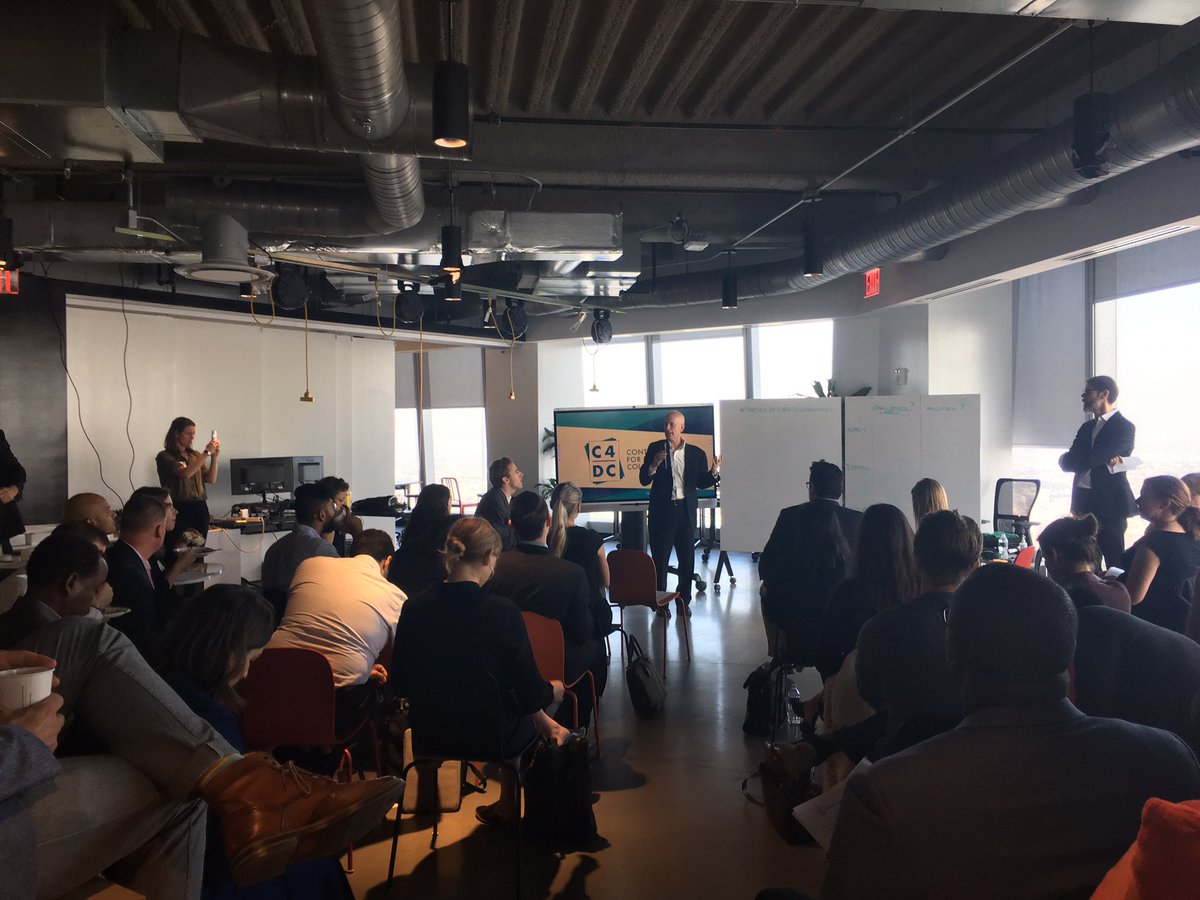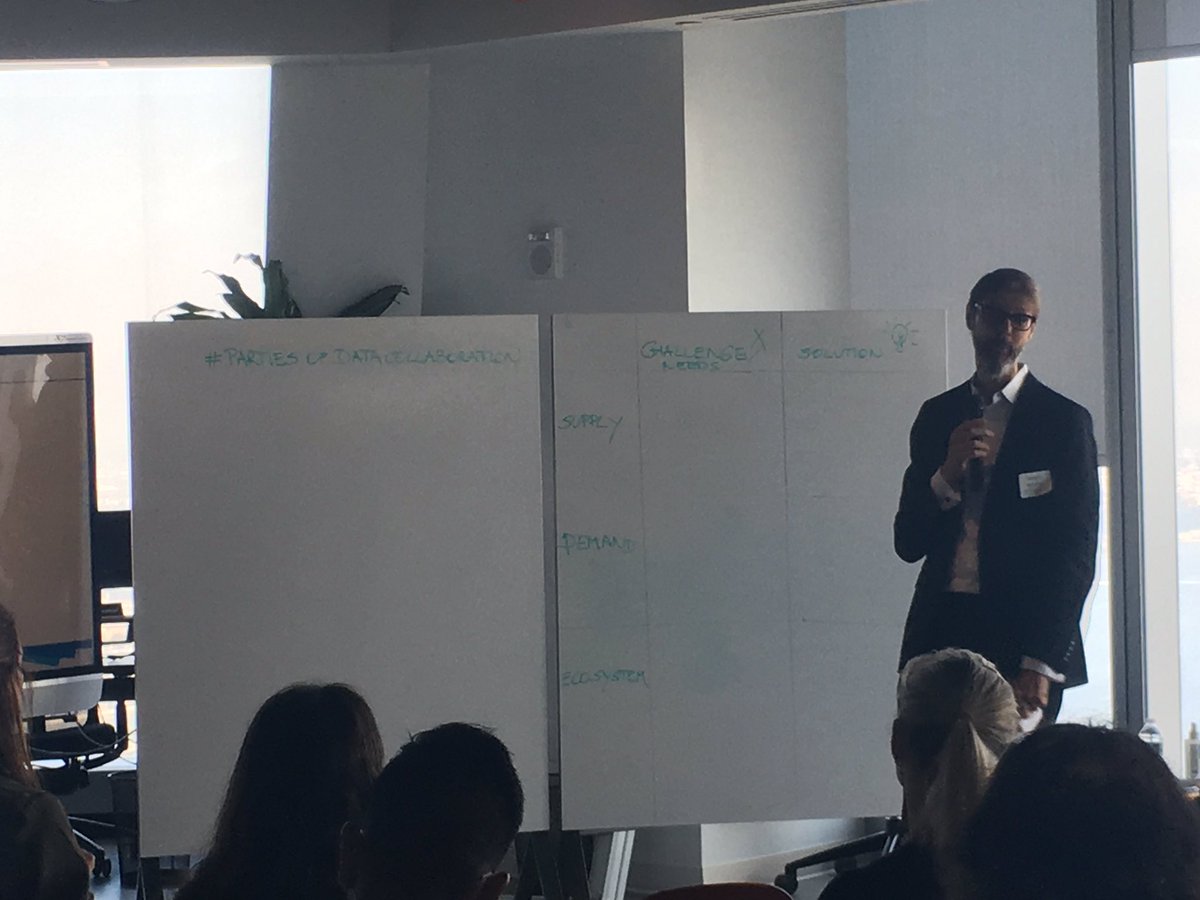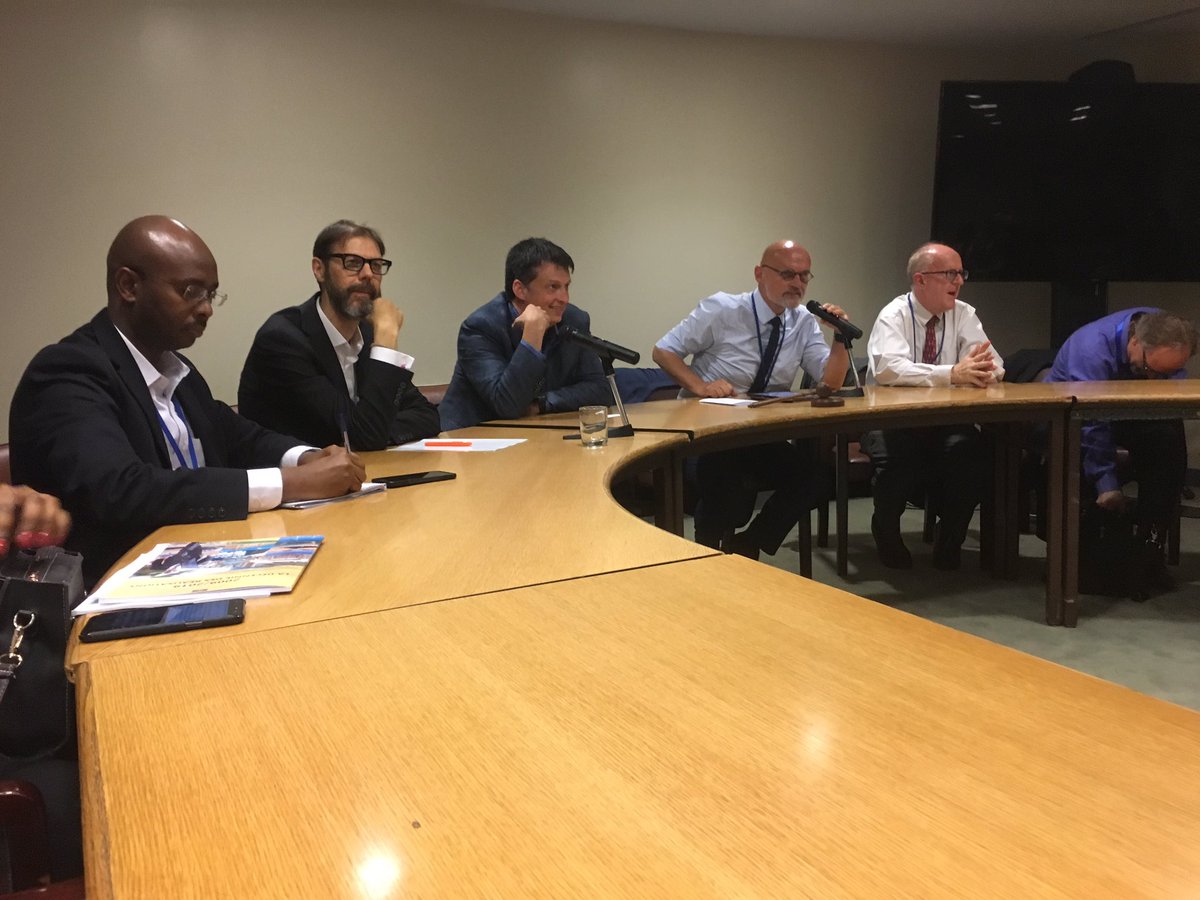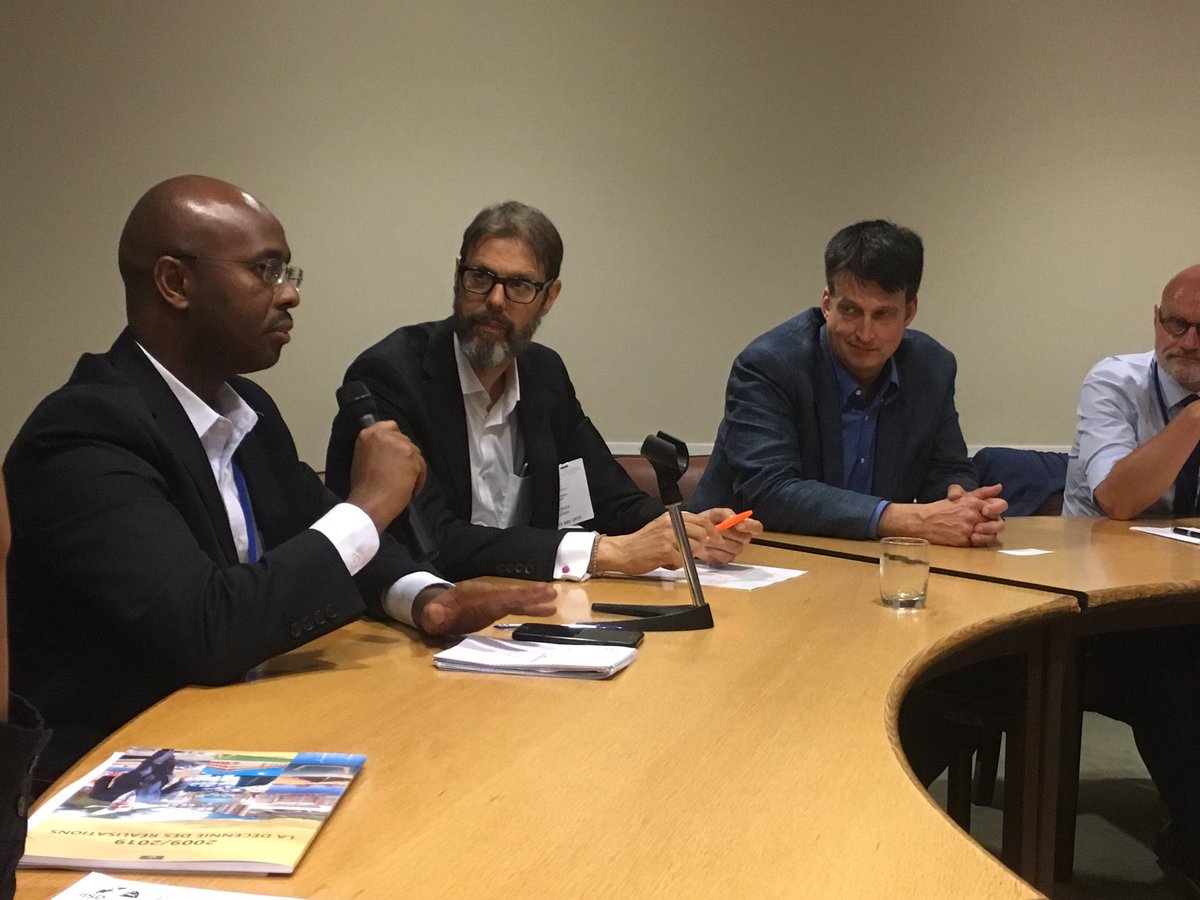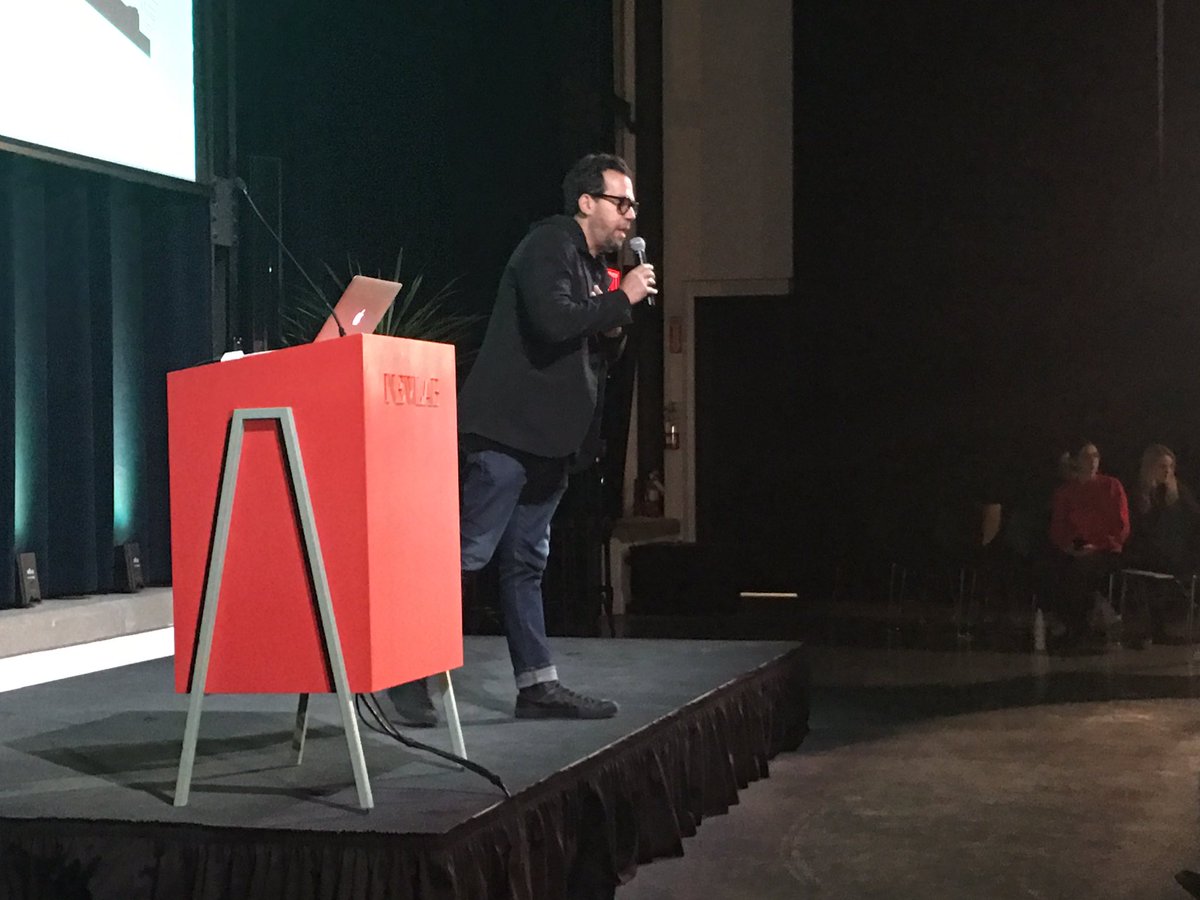
We're now starting our #FINANCEINCOMMON2020 panel on emerging uses of #technology in development now. Join us or follow along with our tweets here.
eventbrite.com/e/emerging-tec…
eventbrite.com/e/emerging-tec…

After a brief intro by The GovLab's @sverhulst , @AFD_en's Peter Addo explains the importance of the project.
"We are trying to find ways to identify the value proposition of new technologies and the risks associated with them as well."
"We are trying to find ways to identify the value proposition of new technologies and the risks associated with them as well."
He goes on to note the way these technologies can allow development practitioners to innovate together and to create together on challenges related to climate, poverty, and many other issues.
Stefaan provides an overview of the intelligence paradigm used in the draft policy paper. The Intelligence Paradigm include:
* Data Intelligence;
* Artificial Intelligence;
* Collective Intelligence; and
* Embodied Intelligence.
* Data Intelligence;
* Artificial Intelligence;
* Collective Intelligence; and
* Embodied Intelligence.

The technologies that make up this paradigm have significant potential to address development challenges, but they have varying relevance to different challenges.
There are also potential risks that #development practitioners should understand.

There are also potential risks that #development practitioners should understand.
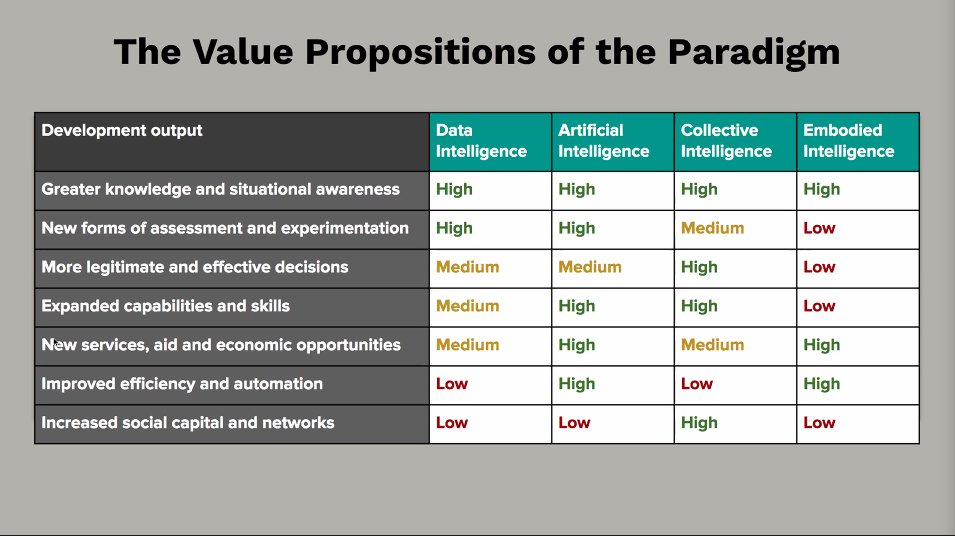

Stefaan introduces the panelists on the call, who will discuss the policy paper, its findings, and ways to operationalize it in various development contexts.
These panelists include @shacheedoshi , @marclepage, @niinarkuquaynor, and @carlos_santiso.
These panelists include @shacheedoshi , @marclepage, @niinarkuquaynor, and @carlos_santiso.

@niinarkuquaynor talks about how the paradigm shifts the focus of discussion from technology to the values they provide.
He notes that the examples in the report suggest that these technologies are quite accessible to a variety of communities seeking to address various issues.
He notes that the examples in the report suggest that these technologies are quite accessible to a variety of communities seeking to address various issues.
Stefaan goes on to ask @carlos_santiso about whether the paradigm resonates given his unique perspectives.
"When you look at Latin America, this is a very interesting topic now. There's a lot of appetite in the public sector to innovate [...] especially in light of the crisis."
"When you look at Latin America, this is a very interesting topic now. There's a lot of appetite in the public sector to innovate [...] especially in light of the crisis."
He goes on, "The movement around state reform is changing. [...] We are modernizing the machinery of government, seeing how we can incorporate the insights from technology into public policy."
"We need to go beyond pilots and start exploring solutions. For data intelligence [and other intelligences], we've moved beyond pilots."
@carlos_santiso underscores the value of collective intelligence, civic participation, is very important because it is about renewing democracy in the digital age.
He also emphasizes how, in Latin America, the use of data intelligence has enormous value for fighting corruption.
He also emphasizes how, in Latin America, the use of data intelligence has enormous value for fighting corruption.
"Five or ten years ago, we were looking at pilots. Today, we need to scale. We need to show the value of the money put into those solutions."
@marclepage of the Asian Development Bank talks about the ways in which this report resonates in his region.
"The things that discussed here are becoming more and more relevant with advancing in computing. The increased access to tech is acceleratingthe need to look into it."
"The things that discussed here are becoming more and more relevant with advancing in computing. The increased access to tech is acceleratingthe need to look into it."
He notes his work looking at the digital transformation inside out to avoid bias and blind spots to make tools available to govs.
"We will slowly but surely get to a point where we need to confront these issues [...] The key element to look into this is experimentation."
"We will slowly but surely get to a point where we need to confront these issues [...] The key element to look into this is experimentation."
@shacheedoshi of USAID : "I think that this approach of using the 4 different intelligences is a great way to bring together so many complex things that are happening in the tech space in a way that is easy to digest."
"We need to recognize that AI and machine learning needs to be given a little more weight. They are all interlinked [...] but [other intelligences] feed into AI and machine learning."
She notes that machine learning is transforming development by helping orgs do things ppl can't
She notes that machine learning is transforming development by helping orgs do things ppl can't
She notes the serious problem of hyped tech but, even though there is a lot of hype around AI and machine learning, there is something quantitatively different.
"There's a whole new model for the way we do our work, where data is at the center of everything."
"There's a whole new model for the way we do our work, where data is at the center of everything."
@shacheedoshi describes how many emerging techs are not that novel anymore. The framework provided by the report is important given how integral this tech is becoming to development work.
Peter Addo of @AFD_en describes the key role of AI, machine learning and other techs play in the contexts development banks work.
He also emphasizes the need for privacy to be a core concern for initiatives.
He also emphasizes the need for privacy to be a core concern for initiatives.
@niinarkuquaynor talks about how he thinks about contextual appropriateness. How do we know if a tech is appropriate for a community and a given purpose?
"There must be sufficient experimentation or adoption for these discussions [...] I subscribe to controlled adoption."
"There must be sufficient experimentation or adoption for these discussions [...] I subscribe to controlled adoption."
"We are going to have to address both barriers and enablers. For examples, for barriers, this issue can be technical in term but [it can also manifest] from the users' side, a need to develop domain knowledge. You have to build up the skills of both sides."
"It's not one-size-fits-all or one side decides. We are going to have to engage in more community discussions [...] because many of these issues are interdisciplinary. We need to discuss [risks] and make them somehow public to develop some methods of addressing them."
Carlos Santiso talks about the risks of the digital divide: "If you don't generate the data, then you start to not to be captured in the #AI systems and therefore you have an issue of access but also exclusion. If you don't have data, you don't exist."
How do we make cost-benefit assessments from a development point of view?
@carlos_santiso emphasizes the need not to talk about the tech. Orgs need to talk about the problem.
@carlos_santiso emphasizes the need not to talk about the tech. Orgs need to talk about the problem.
@shacheedoshi echoes comments by Carlos. "If we want the machine to represent the world, we need to represent the world in the data."
However, she also talks about bias.
"Data is full of biases. If we feed biases into the system, then the system is going to replicate those."
However, she also talks about bias.
"Data is full of biases. If we feed biases into the system, then the system is going to replicate those."
She also talks about the need to include diverse voices into the design of #AI and other systems. There are experts in the areas where the problems are and those people need to be included in the discussion to ensure it is representative.
"Technology is moving very quickly and regulations are obviously lagging behind that. This is happening all over the world, but especially in developing countries. This leaves people behind. It leaves companies behind."
When thinking about cost-benefit analysis, @marclepage talks about the importance of a portfolio approach and the value in thinking about the capacity to scale up a project.
And that's all! Thank you to everyone who joined our #FINANCEINCOMMON2020 panel on emerging uses of #tech.
We invite you to read our draft policy paper at: afd.fr/en/technology-…
We invite you to read our draft policy paper at: afd.fr/en/technology-…
• • •
Missing some Tweet in this thread? You can try to
force a refresh






